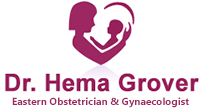High Risk Pregnancy
A high-risk pregnancy is a pregnancy that poses a threat to a woman before or during pregnancy, or after delivery. A high-risk pregnancy demands regular monitoring and special care of both the baby and mother throughout the pregnancy. Recognizing the cause of high-risk pregnancy and taking care of the baby and yourself is considered the best strategy to prevent complications.
Causes
A high-risk pregnancy may occur due to a pre-existing medical condition or problems that can develop during the course of pregnancy. Factors that can cause high-risk pregnancies may include:
- Lifestyle: Alcohol consumption, smoking and use of illegal drugs
- Maternal age: Pregnancy at 35 years or above
- Underlying condition: Diabetes, high blood pressure, anaemia (low oxygen carrying haemoglobin levels in blood), epilepsy (neurological disorder), etc.
- Medical history: genetic conditions, prior pregnancy loss (death of baby), history of C-section or preterm birth (early birth of the baby i.e., before 37 weeks of gestational period)
- Pregnancy complications: Problems in uterus, placenta or cervix; too much or too little amniotic fluid (fluid surrounding and protecting the baby in the womb); supressed foetal growth; when your baby’s blood group is Rh positive and yours is Rh negative; and severe morning sickness
Diagnosis
Your doctor may recommend various diagnostic tests including:
- Amniocentesis: A sample of the amniotic fluid is collected after 15 weeks of pregnancy to examine genetic conditions such as neural tube defects (brain and spinal cord abnormalities).
- Ultrasound scan: An ultrasound produces images of the foetus to check for abnormal development.
- Chorionic villus sampling: A sample of cells removed from the placenta between weeks 10 and 12 of pregnancy is examined for genetic abnormalities.
- Lab tests: Vaginal secretion is analysed for the presence of foetal fibronectin (glue-like substance between the lining of the uterus and foetal sac), which can indicate preterm labour.
- Cordocentesis: Foetal blood sample is collected from the umbilical cord after week 18 of pregnancy to detect chromosomal variations, infections and any blood disorders.
- Biophysical profile: Foetal heart rate and foetal ultrasound are performed to examine your baby’s well-being.
- Cervical length measurement: An ultrasound technique that measures the length of your cervix can identify preterm labour.
Steps to promote a healthy pregnancy
The following are some steps that can prevent risks during pregnancy:
- Preconception appointments: It is good to consult your doctor before planning to get pregnant. You can discuss your medical condition and understand your overall health and chances of pregnancy in detail during your consultation.
- Regular prenatal care: A regular prenatal visit can help your doctor monitor yours and your baby’s health.
- Healthy diet: You will be advised to follow a healthy diet and take essential nutrients like folic acid, calcium and iron.
- Avoid risky substances: You are advised to quit smoking, alcohol and illegal drugs to prevent complications during pregnancy.
- Weight gain: A weight gain of approximately 25 to 35 pounds is recommended if you have had a healthy weight before pregnancy.
Managing high-risk pregnancy
Things you need to know about high-risk pregnancies:
- A home birth is not recommended for women having high-risk pregnancy. It is generally considered safe to deliver your baby in a health care unit or hospital.
- You are advised to report to your doctor if you have vaginal bleeding, pain or cramps in the lower abdomen, watery vaginal discharge or decreased foetal movements.
High-risk pregnancies may instil fear in many, but it is important to stay positive and follow your doctor’s instructions for a healthy and successful pregnancy.
Please contact Dr. Hema Grover to know more about high-risk pregnancies.




